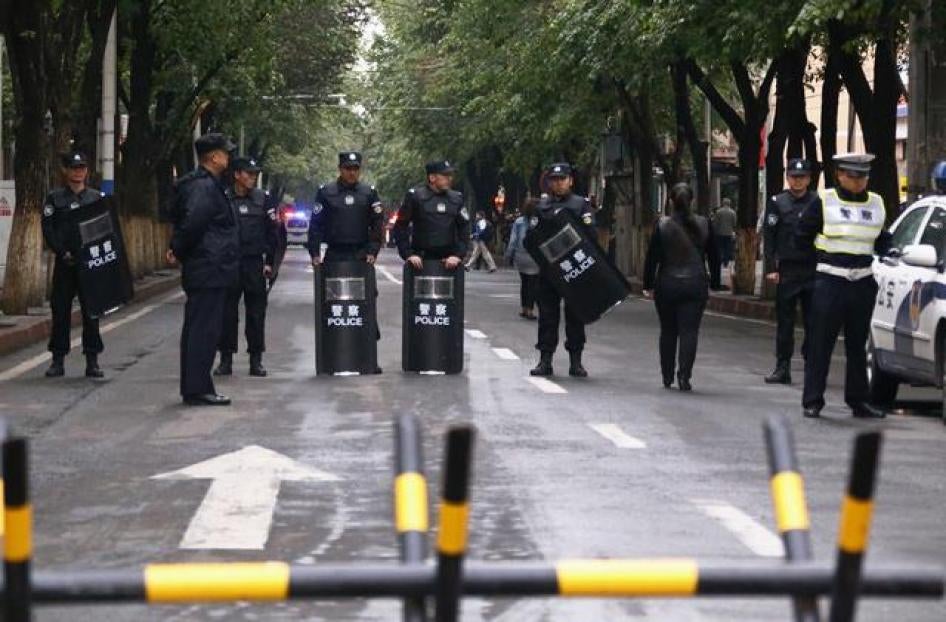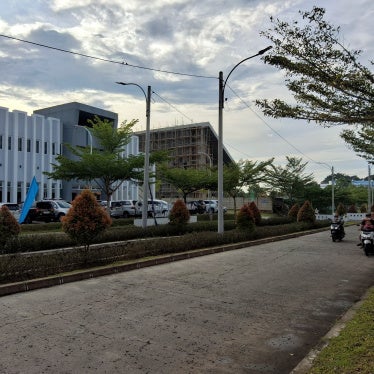(New York) – Chinese authorities should credibly and impartially investigate an explosion in Xinjiang Uyghur Autonomous Region (XUAR) and ensure due process rights for suspects, Human Rights Watch said today. On September 10, 2016, a local police chief was killed and other officers injured when they raided a home where stored explosives were detonated, according to media reports.
“The Chinese government has the responsibility to ensure public safety in the face of those committing reprehensible crimes with explosives,” said Sophie Richardson, China director. “Ensuring public safety includes respecting the basic rights of suspects, so that the genuine perpetrators are fairly prosecuted.”
The blast killed the county deputy police chief, Gheyret Mamut, 45, in a village in Kokterek township, Guma (皮山) county, Hotan (和田) prefecture, South Xinjiang. The authorities have reportedly detained 17 ethnic Uyghurs, including four women, but there is no information on their alleged crimes or their place of custody. Two top county officials have been demoted.
Xinjiang, home to 10 million Uyghurs and other ethnic minorities, is a site of pervasive discrimination, repression, and restriction on fundamental human rights including freedom of religion. Opposition to central and local policies has been expressed in peaceful protests, but also through bombings and other acts of violence.
The sparse information about the blast comes from United States-funded Radio Free Asia and the Hong Kong-based newspaper Mingpao; Human Rights Watch has been unable to independently verify this information. Following previous incidents of public violence in Xinjiang, the Chinese government has provided little information and failed to reveal the whereabouts or well-being of those detained, in violation of international human rights law prohibitions against enforced disappearances.
The Chinese authorities should ensure that those suspected of criminal offenses are treated in accordance with international due process standards. No one should be apprehended using unnecessary or excessive force. Suspects taken into custody should be protected from mistreatment, have immediate access to legal counsel of their choice, be promptly brought before a judge, and be appropriately charged or released. Suspects should also have prompt access to an independent physician and be able to communicate with family members. In a May 2015 report, Human Rights Watch documented the routine use of torture and ill-treatment by police against criminal suspects across China.
Chinese law deprives terrorism suspects of basic protections that are otherwise available to ordinary criminal suspects. Under the Criminal Procedure Law, police do not have to notify families of terrorism suspects for up to 37 days, as opposed to within 24 hours of criminal detention for other suspects. Terrorism suspects can only meet with lawyers upon obtaining police approval. They can also be subjected to six months of secret, incommunicado detention under “designated residential surveillance.”
The Chinese government enacted a new counterterrorism law on January 1, 2016, which adopts an overly broad and vague definition of terrorism that does not necessarily require actual action or violence to prompt a deprivation of liberty, prosecution, or other restrictions. In August, Xinjiang authorities issued a directive to implement the law, becoming the first region in China to do so.
Over the past three years, law enforcement officers have reportedly been responsible for killing hundreds of people in Xinjiang in counterterrorism operations. This has raised serious concerns about the routine use of excessive or unnecessary lethal force, especially since China systematically prevents independent monitoring or reporting of the region.
“China needs to address the problems of Xinjiang by respecting rights as well as through law enforcement,” Richardson said, “For a start, it should allow independent human rights monitors unfettered access into Xinjiang.”









